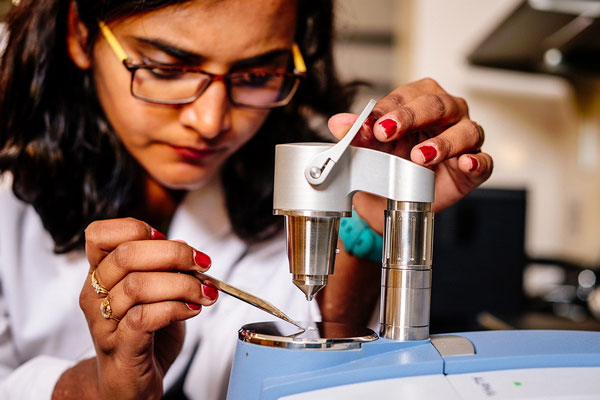
An exciting feature of studying with the Department of Chemistry is your chance to be involved in world-class research programs. You are encouraged to become involved in research early in your undergraduate career.
Our students are engaged in all aspects of meaningful and significant research programs in every area of chemistry and biochemistry, and extending into interdisciplinary programs within the UAB biomedical research complex. Students who demonstrate success in their research projects are encouraged to present their work at regional and national scientific meetings supported by departmental travel grants.
There are two types of undergraduate research credit available in the UAB Chemistry Department:
-
CH 497: Undergraduate Research (2-3 hours)
This ideally includes a minimum of 6 credit hours (two semesters, preferably consecutive) under the supervision of a faculty member mentor, who determines the criteria and schedule for successful completion of the work. These criteria include about 11 research lab hours per week in the fall or spring, or 15 hours per week in the summer (always 150 hours total per semester), although the mentor may require more. You should discuss the schedule with your mentor prior to registering for credit. The chemistry department and/or the mentor may require you to write an abstract/report on the research progress.
You must have at least a 2.5 overall GPA and at least a 3.00 overall GPA in chemistry courses, and may need to have completed certain courses (as determined by the mentor) before signing up for CH 497. Your research proposal must be signed by the mentor, the chemistry advisor, and the chemistry chair, and your GPA must be verified at the end of the term prior to beginning the research credit, before you may register for CH 497. You are expected to maintain a lab notebook and verify hours spent in the lab. GPAs and mentor approval are reverified at the end of each term, and a new or revised proposal is usually required, before you register for subsequent credit.
-
CH 499: Honors Research and Thesis (0-3 hours)
Students normally take CH 497 (two or more semesters) first. You must have an overall GPA of 3.0, a 3.25 GPA in Chemistry, and sufficient progress in research (as determined by the mentor) to participate in Honors Research. You then meet with Dr. Gary Gray to apply before registering. The application form includes a one page abstract describing the content of your proposed Honors Thesis, and must be signed by your research mentor, two faculty advisors (honors thesis committee), and the Honors Director prior to registration for CH 499. During CH 499 you write an Honors thesis, of chemistry research journal quality, which is submitted in written form and presented orally to the committee two to three weeks prior to the end of the term.
Benefits of Research
Chemistry is an experimental science. Its laws and theories are based on research. To truly understand chemistry, you need to appreciate how research is carried out. Many chemistry majors go on to careers that involve or are based on research. Participation in research allows you to decide whether you enjoy research and thus to make more informed career choices.
Strong, professional relationships with research mentors provide you with important insights into career choices and allows faculty members to write stronger recommendation letters for you for graduate and professional schools. Research may also qualify you for scholarship and award competitions, consideration for publication in scientific journals, and presentation of research results at scientific meetings. Any or all of these are impressive on applications and during interviews for graduate/professional schools or employment.
To take advantage of these benefits you will need a research proposal approved by various people before you can be registered for the credit. The earlier you start the process, the more likely it will be approved in time!
How to Apply
For more information or to apply for a research opportunity, email
- a research proposal (usually a paragraph or two)
- the name and department of the faculty mentor
- an overview of the research project and your role in it
- the specific procedures you will carry out (two or more examples)
- the equipment you will use (two or more examples)
- the timeline of when you will learn what (brief, not comprehensive)
- how many hours you plan to work, on average, in the lab
- which semesters you plan to carry out the research.
Note: It is wise to get the mentor’s approval of your written proposal first.